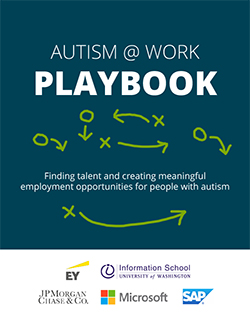
“Nothing about us without us” is a phrase often used to express the need for people to have a say in designing policies that affect their own lives.
It’s also a key tenet in the Autism @ Work Playbook, a resource created by the University of Washington Information School together with several corporate partners. The 61-page document guides organizations and human resources professionals in creating and sustaining appropriate and well-supported employment opportunities for individuals on the autism spectrum.
The playbook offers step-by-step guidance for organizations interested in creating their own inclusive workplace programs, from designing a pilot program that fits the workplace to recruitment, hiring, training and support, as well as how to assist employees with career development and advancement.
“We created this playbook as a way to distill best practices of years of experience and tremendous passion. It is designed to empower organizations of all sizes across all sectors to join the fight to eradicate unemployment for the autism community,” said Hala Annabi, an iSchool associate professor and principal investigator of the Autism at Work research project. “With this guide, organizations can find their way to creating an appropriate and successful inclusive work program that eliminates barriers and provides opportunities for individuals on the autism spectrum.”
The playbook uses insights gained from workplace experiences of the members of the multi-partner Autism @ Work Employer Roundtable, launched in 2017. The roundtable comprises representatives of partner corporations working to reduce unemployment rates among individuals with autism, which are often 80% or higher. And according to a 2015 National Autism Indicators Report from Drexel University, only about 58% of young adults on the spectrum are employed outside the home after high school and before their early 20s.
The roundtable has grown from a handful of organizations to more than 15, including Microsoft, J.P. Morgan Chase, EY (Ernst & Young), SAP Software Solutions, Fidelity Investments and several more.
 “For some, they’re just trying to figure out how to design and launch their programs,” Annabi said. But the main focus for most employers was the same as when they engage with neurotypical employees: finding the right talent and placing people in the right jobs.
“For some, they’re just trying to figure out how to design and launch their programs,” Annabi said. But the main focus for most employers was the same as when they engage with neurotypical employees: finding the right talent and placing people in the right jobs.
“There are a number of firms that need talent, particularly technology talent, around a set of characteristics or skills that many with autism have and can offer,” Annabi said. In addition to that practical need, some firms are driven by principle. “Social impact is important to them. They want to address the unemployment rate among people with autism.”
Autism hiring programs have benefits to firms aside from just filling jobs, Annabi noted. By adapting to be more inclusive of people with diverse needs, workplaces become more inclusive across the board. Such programs also are evidence of a broader culture of accessibility and inclusion, which appeals to other job candidates as well.
“There’s some research that suggests that top talent, particularly millennials, want to work for companies that have a social conscience,” Annabi said. “Autism-related programs are one way they can do that.”
The guide itself is the product of a collaborative research project called Autism-Ready Workplace: Creating and Sustaining Autism Hiring Initiatives, led by Annabi. In her research, Annabi worked with iSchool graduate student Liz Crooks to study autism-at-work programs already in place at Microsoft, SAP Software Solutions, JPMorgan Chase and EY (Ernst & Young). They looked at organizational strategies, employment and resourcing models, and hiring and training to discern best practices, and distilled them for the playbook.
The two conducted their research with the assistance of ACCESS-IT, an iSchool-based research group — which is led by Annabi — that works to improve the representation of women and individuals with autism in the information technology industry.
Annabi also discussed the playbook in an April 17 meeting in Washington, D.C., of the U.S. Department of Health & Human Services’ Interagency Autism Coordinating Committee in a presentation titled “Autism-Ready Workplace: Creating and Scaling Autism Hiring Initiatives.”
The playbook returns to the theme of “Nothing about us without us” in its chapters on program design and employee retention, and emphasizes several key points:
- Spend time with internal and external partners from the autism community to guide program design, and learn about your autism community’s needs, resources and preferences
- Customize your program to fit your organization and dedicate sufficient resources and focused attention to make it a success
- Avoid making assumptions about the skills, interests and needs of individuals with autism — and ask questions to learn about the diversity in the needs, desires and talents of employees
“Only when we come together across organizations and industries will we truly make an impact in changing the unemployment rate for people with autism,” said Neil Barnett, director of inclusive hiring and accessibility at Microsoft.
Research and work on the Autism @ Work Playbook was sponsored by Microsoft.
Autism at Work Research Workshop
The UW Information School is co-sponsoring the invitation-only 2nd Annual Autism at Work Research Workshop in Redmond May 29-31. More information online.
###
For more information about the Autism @ Work Playbook, contact Annabi at 206-685-5585 or hpannabi@uw.edu; to learn more about the Autism @ Work Employer Roundtable, visit online or email info@disabilityin.org.
Additional information for this story was provided by iSchool staff.